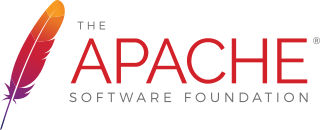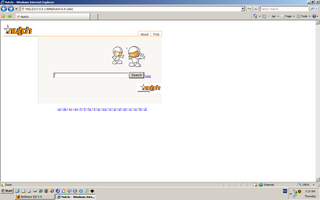
The Apache Software Foundation is an American nonprofit corporation to support a number of open-source software projects. The ASF was formed from a group of developers of the Apache HTTP Server, and incorporated on March 25, 1999. As of 2021, it includes approximately 1000 members.

Apache Subversion is a software versioning and revision control system distributed as open source under the Apache License. Software developers use Subversion to maintain current and historical versions of files such as source code, web pages, and documentation. Its goal is to be a mostly compatible successor to the widely used Concurrent Versions System (CVS).

The Apache License is a permissive free software license written by the Apache Software Foundation (ASF). It allows users to use the software for any purpose, to distribute it, to modify it, and to distribute modified versions of the software under the terms of the license, without concern for royalties. The ASF and its projects release their software products under the Apache License. The license is also used by many non-ASF projects.

Apache Nutch is a highly extensible and scalable open source web crawler software project.
BeanShell is a small, free, embeddable Java source interpreter with object scripting language features, written in Java. It runs in the Java Runtime Environment (JRE), dynamically executes standard Java syntax and extends it with common scripting conveniences such as loose types, commands, and method closures, like those in Perl and JavaScript.
Apache Harmony is a retired open source, free Java implementation, developed by the Apache Software Foundation. It was announced in early May 2005 and on October 25, 2006, the board of directors voted to make Apache Harmony a top-level project. The Harmony project achieved 99% completeness for J2SE 5.0, and 97% for Java SE 6. The Android operating system has historically been a major user of Harmony, although since Android Nougat it increasingly relies on OpenJDK libraries.
Free/open-source software – the source availability model used by free and open-source software (FOSS) – and closed source are two approaches to the distribution of software.
Apache Jackrabbit is an open source content repository for the Java platform. The Jackrabbit project was started on August 28, 2004, when Day Software licensed an initial implementation of the Java Content Repository API (JCR). Jackrabbit was also used as the reference implementation of JSR-170, specified within the Java Community Process. The project graduated from the Apache Incubator on March 15, 2006, and is now a Top Level Project of the Apache Software Foundation.

Jim Jagielski is an American software engineer, who specializes in web, cloud and open source technologies.

Google Wave, later known as Apache Wave, is a discontinued software framework for real-time collaborative online editing. Originally developed by Google and announced on May 28, 2009, it was renamed to Apache Wave when the project was adopted by the Apache Software Foundation as an incubator project in 2010.
The Apache Traffic Server (ATS) is a modular, high-performance reverse proxy and forward proxy server, generally comparable to Nginx and Squid. It was created by Inktomi, and distributed as a commercial product called the Inktomi Traffic Server, before Inktomi was acquired by Yahoo!.

Apache OpenOffice (AOO) is an open-source office productivity software suite. It is one of the successor projects of OpenOffice.org and the designated successor of IBM Lotus Symphony. It was a close cousin of LibreOffice, Collabora Online and NeoOffice in 2014. It contains a word processor (Writer), a spreadsheet (Calc), a presentation application (Impress), a drawing application (Draw), a formula editor (Math), and a database management application (Base).

Apache Drill is an open-source software framework that supports data-intensive distributed applications for interactive analysis of large-scale datasets. Built chiefly by contributions from developers from MapR, Drill is inspired by Google's Dremel system. Drill is an Apache top-level project. Tom Shiran is the founder of the Apache Drill Project. It was designated an Apache Software Foundation top-level project in December 2016.

Apache Stanbol is an open source modular software stack and reusable set of components for semantic content management. Apache Stanbol components are meant to be accessed over RESTful interfaces to provide semantic services for content management. Thus, one application is to extend traditional content management systems with semantic services.

Apache Bloodhound is an open source web-based project management and bug tracking system. The program is built on top of Trac. It is developed and maintained by volunteers at the Apache Software Foundation.
Apache Allura is an open-source forge software for managing source code repositories, bug reports, discussions, wiki pages, blogs and more for any number of individual projects. Allura graduated from incubation with the Apache Software Foundation in March 2013.
Apache Kafka is a distributed event store and stream-processing platform. It is an open-source system developed by the Apache Software Foundation written in Java and Scala. The project aims to provide a unified, high-throughput, low-latency platform for handling real-time data feeds. Kafka can connect to external systems via Kafka Connect, and provides the Kafka Streams libraries for stream processing applications. Kafka uses a binary TCP-based protocol that is optimized for efficiency and relies on a "message set" abstraction that naturally groups messages together to reduce the overhead of the network roundtrip. This "leads to larger network packets, larger sequential disk operations, contiguous memory blocks [...] which allows Kafka to turn a bursty stream of random message writes into linear writes."
Apache PDFBox is an open source pure-Java library that can be used to create, render, print, split, merge, alter, verify and extract text and meta-data of PDF files.
SwellRT was a free and open-source backend-as-a-service and API focused to ease development of apps featuring real-time collaboration. It supported the building of mobile and web apps, and aims to facilitate interoperability and federation.
Apache CarbonData is a free and open-source column-oriented data storage format of the Apache Hadoop ecosystem. It is similar to the other columnar-storage file formats available in Hadoop namely RCFile and ORC. It is compatible with most of the data processing frameworks in the Hadoop environment. It provides efficient data compression and encoding schemes with enhanced performance to handle complex data in bulk.








